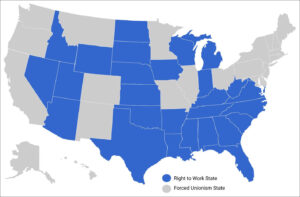
by James A. Bacon
Democrats may or may not be poised to take control of the Virginia General Assembly. Steve Haner, who knows infinitely more about Virginia politics than I do, thinks Republicans have a shot at retaining their majorities. But from my untutored perspective, all signs point to a big Democratic win this fall. A return of state governance to the Democrats has very different implications today than it would have, say, 20 years ago. This is not the party of Jerry Baliles, Doug Wilder or even Mark Warner (back when he governed the state as a moderate). The Dems have moved far to the left and, as I opined recently, issues that were never issues before now are.
A case in point: A Virginia Chamber of Commerce survey of state lawmakers has found that a majority of Democratic lawmakers say they oppose the state’s right-to-work law.
Reports VPM:
Dozens of Democratic candidates skipped the question or did not respond to the Chamber’s annual survey. But a majority answered, and all but three candidates in the House of Delegates and four in the Senate said they did not support the law. Most of the candidates who made that pick were either incumbents in safe Democratic districts or challengers with no legislative record.
The right-to-work law protects workers from the compulsion to join a union when they accept a job at a unionized workplace. The moral case for the law is to preserve an individual’s freedom of choice. The practical case is that a state’s right-to-work status is as significant factor when corporations decide where to locate new facilities, especially manufacturing facilities. Pro-business Democrats of yore, many of whom had rural roots, once supported the law as a foundation of Virginia’s economic competitiveness.
Many of today’s Democrats feel differently. Del. Lee Carter, D-Manassas, a self-described socialist, sponsored a bill in the 2019 session to repeal the law. The legislation is entitled, “Right to work; union shops and agency shops.” It might better be described as “The Rural Virginia Dis-investment Act.”
It’s not as if the urban/suburban constituents represented by Democrats in Virginia are clamoring to repeal the law. What’s going on? Very simple: Organized labor (as opposed to the actual working class people labor unions represent) are one of the most consistently pro-Democratic interest groups in the country. In Virginia, labor unions have contributed almost $3.9 million during the current electoral cycle — almost exclusively to Democrats and “other,” according to the Virginia Public Access Project. (I’m not sure what “other” refers to, but it’s not Republicans.)
Eliminating the right-to-work law will boost union membership, which will increase union dues, which will shovel more money into campaign contributions, which will fill the coffers of Democratic Party candidates.
Next on the slippery slope to becoming New Jersey: Let public-sector employees unionize!

Leave a Reply
You must be logged in to post a comment.